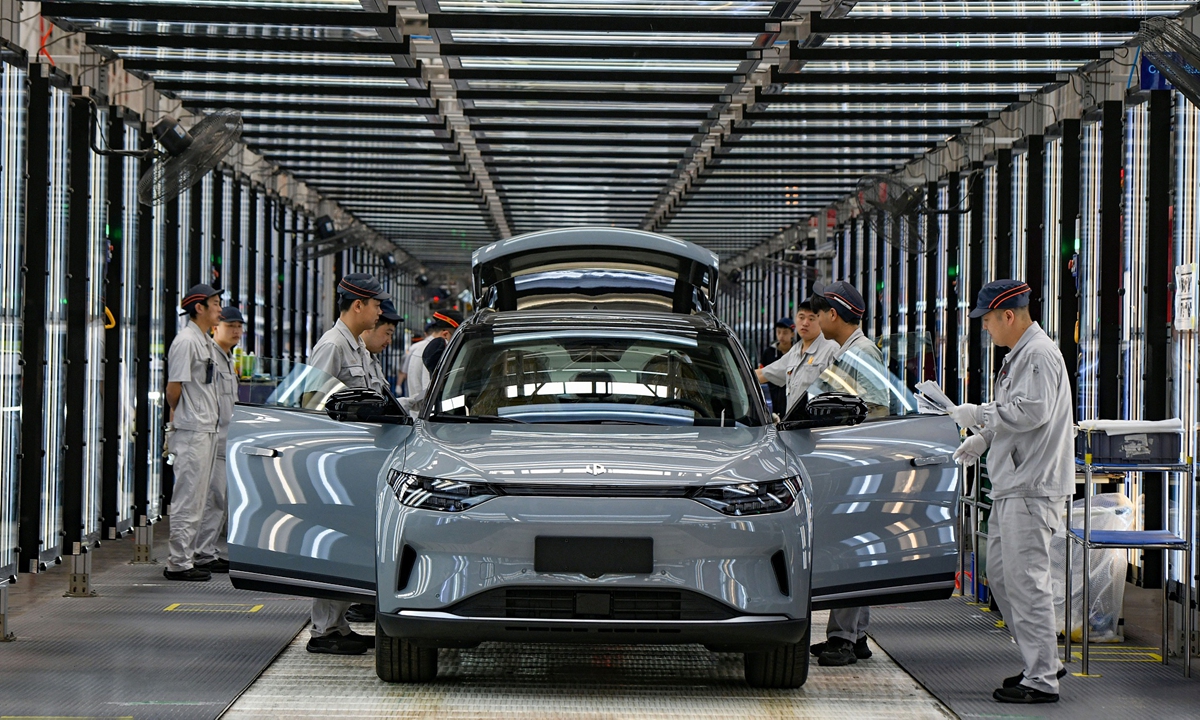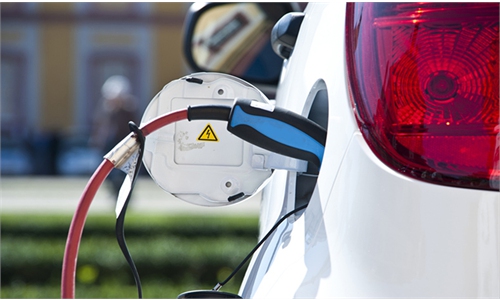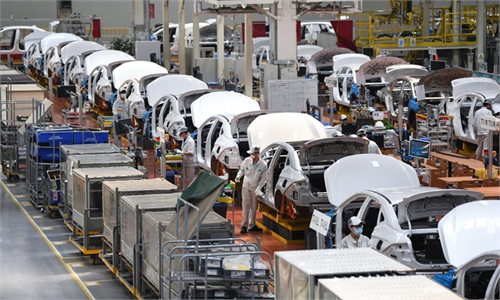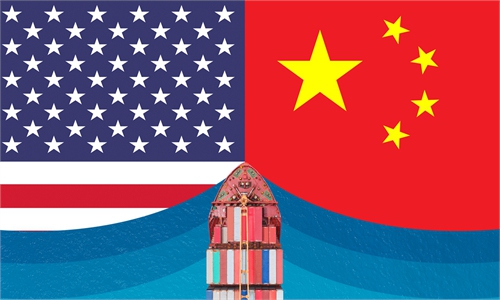
Workers complete assembling an electric vehicle (EV) at China's EV start-up Leapmotor in Jinhua, East China's Zhejiang Province on April 1, 2024. The smart EV factory delivered 14,567 new vehicles in March, a yearly increase of 136 percent. Photo: VCG
Following loud opposition against the European Commission (EC)'s decision to impose additional tariffs on Chinese electric vehicle (EV) imports, Chinese government departments and organizations on Thursday urged the EU to immediately correct its wrongdoings and get back to the rational track of handling disputes through dialogue and consultations, with the Chinese Foreign Ministry vowing to take "necessary measures" and China's Ministry of Commerce (MOFCOM) stating it reserves the right to resolve the dispute at the WTO.In a statement, the European Commission announced on Wednesday that it will impose an additional provisional duty of between 17.4 percent and 38.1 percent on EVs from China from early July.
The heavy-handed tariffs, coming less than a month after a decision by Washington to quadruple its tariffs on Chinese EVs to 100 percent in May, will hit Chinese brands such as BYD, Geely and SAIC.
Responding to media reports that relevant industries are collecting evidence to file an application with authorities to launch an anti-dumping probe into certain EU pork and dairy products, MOFCOM said that Chinese industries have the right to file applications for anti-dumping investigations, and relevant authorities will review the applications and file cases in accordance with the law.
On Thursday, Chinese Foreign Ministry spokesperson Lin Jian urged the European side to listen to the rational voices from all sides and immediately correct its wrong practice, stop politicizing trade and economic matters, handle trade frictions via consultations and avoid damaging mutual trust and dialogue.
"China has principles that it must safeguard, that is, WTO rules and market principles. China also has interests it must protect, that is, the legitimate rights and interests of Chinese EV industry and enterprises," spokesperson Lin said.
MOFCOM spokesperson He Yadong told a press briefing on the same day that China reserves the right to file a dispute suit against the EU over the EV tariffs.
Observers said the EC's behavior and the roughly handled probe, which was excessive, could invite similar Chinese responses, with retaliatory measures to be rolled out in the near future.
Even before affected Chinese companies reacted to the tariffs, a number of European carmakers on Wednesday expressed opposition to the European Commission's imposition of countervailing tariffs on Chinese EVs, saying such a protectionist move will only harm the European auto industry.
"Countervailing duties are generally not suitable for strengthening the competitiveness of the European automotive industry in the long term - we reject them," Volkswagen Group said in a statement to the Global Times on Wednesday.
The Germany-based group further said that the timing of the decision is detrimental to the current weak demand for battery electric vehicles in Germany and Europe. "The negative effects of this decision outweigh any potential benefits for the European and especially the German automotive industry," the statement said.
A number of EU member countries also promptly issued vocal opposition to the EC decision.
Norway, which has the highest density of EVs in the world, will not join the EU's increase in tariffs on Chinese electric cars, Bloomberg reported, citing Finance Minister Trygve Slagsvold Vedum. "Introducing tariffs on Chinese cars is neither relevant nor desirable for this government," Vedum said in an emailed comment.
On Wednesday, Hungary's economy ministry said the country disagrees with Europe's "brutal" punishment of Chinese EV manufacturers. "Instead of punitive tariffs, the EU should support the European EV industry," the ministry said in a statement.
In a statement on Thursday, the China Council for the Promotion of International Trade (CCPIT), China's trade promotion agency, said that the European Commission's probe has apparently violated relevant WTO rules and that Chinese companies and industries will resort to legal means to safeguard their lawful interests under the WTO. CCPIT urged the European Commission to immediately scrap its tariff decision and abide by WTO rules, and settle disputes through dialogue and consultation.
Intertwined interests
Observers said the European Commission's reckless move is blatant government intervention in the market and jeopardizes the China-EU automotive supply and value chain, which took years to develop into its current landscape and whose bilateral business interests are closely intertwined. They warned the risks of spillover and chain reactions.
A number of European companies other than the automotive sector have also expressed concern.
Following the tariff announcement, dairy producers and pork exporters are on high alert for potential retaliatory tariffs from China, Reuters reported on Thursday.
A spokesperson with Europe's Airbus said that trade tensions were challenging for global businesses.
"Despite internal opposition, the European Commission has been headstrong in imposing tariffs on Chinese EVs. The move harms European consumers' interests and will not help resolve China-EU disputes in the EV sector through negotiations, potentially leading to a lose-lose situation," Ding Chun, director of the Center for European Studies at Fudan University, told the Global Times on Thursday.
The main opposition to tariffs came from carmakers with interests in the Chinese market and those with strong competitive advantages, Ding noted. "This decision could affect their market revenue and cooperation with Chinese car manufacturers and battery production companies in the EV sector, which also creates obstacles for them to enhance their own competitiveness," he said.
Many of the leading European automakers have invested heavily in China and in recent years particularly in the NEV supply chain. Many auto parts suppliers in the EU also benefited from the arrival on the stage of China's emerging brands, many of which are EV makers.
According to a report by Mercator Institute for China Studies and Rhodium Group, greenfield investment accounted for as much as 78 percent of all Chinese investment into Europe in 2023. Many of these new factories are related to the NEV industries, such as battery production facilities.
Netherlands-headquartered European automaker Stellantis said in a statement it sent to the Global Times on Thursday that "as a global company, Stellantis believes in free and fair competition in a worldwide trade environment and does not support measures that contribute to the world's fragmentation."
"We strongly oppose the use of increased tariffs as a strategy to obstruct the normal global trade of electric vehicles. This approach hinders rather than promotes global environmental protection, emission reduction, and sustainable development," Chinese EV maker Nio said in a statement sent to the Global Times on Thursday.
SAIC and Geely issued separate statements on Thursday, expressing their disappointment and urging the EC to carefully consider its decision."
"The swift and loud opposition from EU industries and member countries is a reminder that the EC's politically charged probe could not even garner the support of those it claimed to protect," Cui Hongjian, a professor at the Academy of Regional and Global Governance with Beijing Foreign Studies University, told the Global Times on Thursday.
Chinese and European companies, especially German automakers, have in-depth cooperation in the field of EV, and some of China's EV production capacity has "mixed blood" from European capital and technology, Cui said.
"The tariff distorts normal market competition, is detrimental to the European automotive market and will undermine European EV competitiveness in the long run," Cui pointed out.
Dialogue the only path
Chinese officials and analysts said the only way for the EU to solve any trade dispute is through dialogues.
Cui said the probe, which lacked openness and consultation, reflected a lamentable fact that the EU has sped down the path of protectionism and unilateralism under the influence of the US.
Although the EC announcement suggests the tariffs won't land until early July and there is still time for a "solution," experts doubt the outcome given the tight timetable and EU politicians' limited energy following an election.
Cui expects that following the EC's excessive behavior from this probe, Chinese authorities are expected to respond, with retaliatory measures to be rolled out in the near future.




